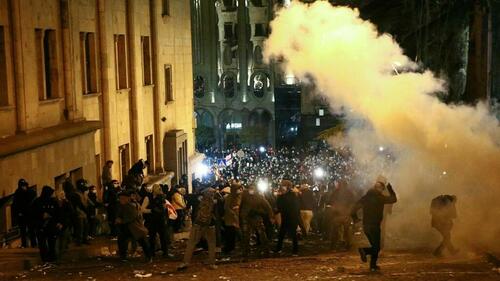December 21, 1991 was adopted the Declaration of Independence of the Republic of South Ossetia. A correspondent of IA "Res" asked the former head of the information department of the South Ossetian Joint Control Commission on the Georgian-Ossetian conflict, the independent expert Inal Pliev to tell about the significance of the adoption of this document.
It should be noted that the Declaration of Independence of the Republic of South Ossetia was adopted on December 21, 1991, that is, after the resignation of the first and the last President of the USSR Mikhail Gorbachev, that is, after the collapse of the unified federal state, a part of which until recently was South Ossetia. This fact alone is a sufficient reason to exclude any suspicions, that South Ossetia was a separatist country, for not before the collapse of the Soviet Union or after, South Ossetia did not adopt any legal act, which would come into conflict with the regulatory environment of that period.
Unfortunately, I must focus on a gross error, which is often made not only by our opponents, but also by some of our well-wishers, and even by our fellow citizens, who call us the separatists, and our struggle – the separatist; they somehow or other mention South Ossetia in context with separatism. We can easily understand our opponents, because separatism is a serious crime, worthy of every kind of condemnation and reaction, and, of course, they want to hang that label on us to deprive the sympathy and support. But it's hard to understand those who for 22 years have not understood that between separatism and the liberation movement is a huge difference.
The struggle of the people of South Ossetia priorto a collapse of the Soviet Union could not be the separatist, for the simple reason that separatism showsa desire for separation, isolation, a desire to withdraw from the territory of the state whose part it is. As for South Ossetia, it has never raised the issue of withdrawal from the Soviet Union, but even being an autonomy within the seceding Republic in full accordance with the Law of the USSR "On the procedure for solving problems related to secede from the Soviet Union," on its own, as it is underlined in the Act, in 1990, adopted a resolution of its supreme body - the Council of People's Deputies, that if Georgia seceded Soviet Union, in South Ossetia would be applied the laws of the Soviet Union, that is, South Ossetia would remain a part of the USSR. Let me remind you that the one, who suggests remaining in his state, cannot be a separatist. The fact that this decision was based on the free will and choice of the people and fully reflected their position, said the outcome of the referendum of the USSR on March 17,1991, held in the territory of South Ossetia, but in Georgia was banned by the then government of Georgia. This fact also suggests that on March 17, 1991 in South Ossetia, controlled by the legal authorities, the laws of the USSR were observed, in contrast to Georgia, and in contrast to those parts of South Ossetia, which at that time were occupied by the armed forces of Georgia.
There is no single legal act, which says that South Ossetia was seceding from Georgia. Political and legal demarcation of South Ossetia and Georgia was not a consequence of the decision of South Ossetia. This was not necessary, because the decision of demarcation was legally made by Georgia. Namely - knowing about the above Resolution of the Council of People's Deputies of South Ossetia, Georgia on April 9, 1991, symbolically, on the second anniversary of the April 1989 tragedy, adopted the Act on the restoration of Georgia's independence, thus separating from the USSR and leaving South Ossetia a part of the Soviet Union. This "mistake" Georgia was hoping to "correct" by force of arms, by partial destruction and partly - expelling the Ossetian population from South Ossetia. All the more, that a major part of South Ossetia was occupied by illegal armed groups of Georgia and the Georgian Interior Ministry troops, National Guard of Georgia, and later – by the troops of the State Council of Georgia, who acted in concert. Despite the fact that at that time the South Ossetian side displayed exceptional humanity (thus, there was no burned any Georgian village), the Georgian side acted with refined cruelty - many Ossetian civilians were killed, were looted and burned 117 Ossetian villages, some villages ( Khelchua, Tliakana, etc.) were burned with the residents in their homes.
If the tragic events and armed clashes, taking place before April 9, 1991 at a stretch could be called the civil war (since both South Ossetia and Georgia were parts of one state - the USSR), since April 9, 1991, when Georgia adopted the Act on restoration of its state independence, the Georgian armed forces in South Ossetia turned into the foreign military invaders in the territory of the Soviet Union, because Georgia was not more part of the Soviet Union, and South Ossetia remained a part of the Soviet Union. As we know, the real power representatives of the Soviet Union led by the President of the USSR Mikhail Gorbachev, headed for collapse of the Soviet Union and encouraged the forces that acted in the appropriate direction, and the forces, sought to preserve the Soviet Union, were brutally suppressed. Therefore, there were not taken any effective measures to restore the law in the South Ossetian part of the USSR and to expel the foreign aggressors.
However, legally South Ossetia was still a part of the Soviet Union, so - not a part of Georgia. I know, some authors put forward the view that legally the independence of Georgia should be counted not from the date of the Act of April 9, 1991, but since the collapse of the Soviet Union in December 1991. I cannot agree with this very biased point of view, since it calls in question the legitimacy and competency of the Act on the restoration of the independence of Georgia on April 9, 1991. The same act, in my opinion, cannot be invalidated as long as it is not cancelled or annulled by the relevant state authorities of Georgia, with the appropriate legal authority.
Hence, the struggle of the people of South Ossetia from 1991 to 2008 was a struggle against the foreign invaders; having nothing to do with separatism. Liberation struggle which has taken various forms of direct clashes to the diplomatic confrontation.
Also, a little distracted from the topic, I cannot evade another common error of many political scientists and experts. It is believed that the document on division of the territories between the new states on the borderline of the former Soviet Union republics, signed by heads of states, is the basis to consider South Ossetia a part of Georgia. This view is wrong, because at the time of signing that document, as was mentioned above, South Ossetia was not more a part of the Republic of Georgia (now - Georgia), the Russian Federation or any other state -signatory of this document.
Thus, after the collapse of the Soviet Union, South Ossetia was out of state and territorial boundaries of any state and it could find itself in a legal vacuum. In order to avoid this, was adopted the Declaration of Independence and the relevant regulations. Despite the fact that the document was a declaration, which had no legal force (Act of Independence of the Republic of South Ossetia was adopted only on May 29, 1992), it showed the course of the further movement of our people and the future direction of legislative work of the parliament.
Thus, recalling that Declaration today, we should thank its sponsors, MPs, who, despite the difficult times (almost always the sessions were being held under the roar of artillery fire, and the deputies came to the sessions right out of the trenches and returned there after the sessions), devoted much attention to the rule of law.
If the declaration of independence of South Ossetia had been adopted even the day before, under the current President of the USSR, under the current Soviet Union regime, the position of South Ossetia would have been obtained separatist, illegal. We could not have counted on the support of other countries. But it was scrupulous observance of the numerous legal issues in adopting this and other crucial documents of our then-legislators, that has ensured the flawless unwavering legal basis for the independence of South Ossetia, that in the end, encouraged the Russian Federation and a number of other countries to recognize the independent state of the Republic of South Ossetia .






